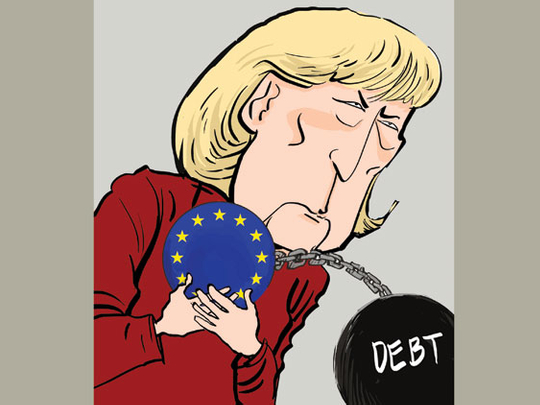
Yes, of course, she is the safest pair of hands a country can ever wish to have, a German colleague said about German Chancellor and Christian Democrats Party (CDU) leader Angela Merkel, after she won a remarkable third term in last Sunday’s general election.
Joining an almost exclusively German gathering of the local German community in Ham, a posh area of Richmond in West London, to follow the election results, my colleague explained: “Not only Germany now feels secured, but also the European Union as a whole.”
Not everyone would find this argument acceptable, especially during a period of what many would consider as an almost “collective recession” in the continent, including the other two larger economies of France and Britain.
The social suffering and economic concerns are even many times greater in the medium and small size economies such as Spain, Portugal and Greece. The latter almost went bankrupt had it not been for Germany which came to the rescue with its bailing out action, not once, but twice in the last three years.
A fundamental debate has lately been going on in EU and beyond about Germany’s ability to continue its role in leading Europe with its GDP of $3.60 trillion (Dh13.21 trillion). It is the world’s fourth largest economy after the US $15.68 trillion, China’s $8.23 trillion and Japan’s $5.86 trillion. The discussion focuses on Germany’s role as the ‘Engine of Europe’ and on whether the country’s policy would ‘Germanise’ Europe or if the EU will eventually drag Germany deeper into Europe.
German Finance Minister Wolfgang Schauble has made it quite clear recently when writing in a newspaper article published simultaneously in London, Paris, Rome, Madrid and Warsaw. He said: “We Germans don’t want a German Europe.”
Merkel herself is not known for being strong on foreign policy. Her main concern in the last two terms of government since 2005 has been to maintain her steady hand policy in the economy, and simultaneously keep away from promoting further step of unionistic nature within Europe. The German Chancellor has shown over the last eight years of government her true mettle of being inclined to run a European coalition states rather than European united states.
‘No more heroes’ seems to be the dominant culture in post-war Germany. The Germans have suffered a great deal during the 19th and 20th centuries as a result of their leaders’ blindly ambitious expansionist policies. Following the capture of Paris in January 1871, Wilhelm the First was crowned the first Kaiser of the German Empire uniting the German states into one country.
But the most devastating 50 years period in the modern history of Germany began in 1914, when Germany declared war on Russia and France, kicking off the First World War. In 1919, after the end of the war, the national assembly met in Weimar and wrote a new constitution for a newly-born German republic known as the Weimar Republic.
Having failed in his armed rebellion attempt as a leader of the National Socialist German Workers Party in 1923, Adolf Hitler was appointed as a chancellor 10 years later by the then president, Paul von Hindenburg, marking the beginning of Nazi Germany. In 1934, Hitler declared himself “der Fuhrer” and his government was called the ‘Third Reich’.
The following decade was tragic and devastating for the German and European nations, with Hitler annexing Austria in 1938, occupying Czechoslovakia and invading Poland in 1939, thus triggering the Second World War. In 1940, Germany captured Denmark, Norway, the Netherlands, Belgium, France and Luxembourg. The agony, the destruction of cities and the killing in Europe’s fields ended when Germany surrendered in May 1945.
In 1949, the Allies divided Germany when US, UK and France approved a constitution for western Germany (Federal Republic of Germany), and the former USSR helped in establishing East Germany (the German Democratic Republic). In May 1955, West Germany obtained independence. At the height of the Cold War, the infamous Berlin Wall was erected in August 1961. 28 years later the Wall was demolished and East and West Germany were reunited on October 3, 1990.
Now with her stunning election result winning a better-than-expected 41.5 per cent of the vote, Merkel has consolidated her role as the most powerful leader in Europe. In view of her status in Europe and on the world stage, her general approach to foreign policy in unlikely to change. Even on Europe, her policy would remain the same as indicated in her press conference last Monday.
To succeed in this policy, Merkel is desperately in need of willing partner at home (she is short of absolute majority by five members). If she fails to convince the Social Democrats (SPD) to join her in Grand Coalition, Merkel will likely go back to the ballot box with the view of winning overall majority. With her steady approach towards difficulties of debts, austerity and depression facing southern Europe countries, Merkel will continue to cut inter-governmental deals in the 18 Eurozone states (Latvia joins next January) or within the 28 EU countries.
With the gradual decline in the popularity of France’s Francois Holland, Merkel will find great support for her policy in Britain’s David Cameron and medium-sized partners such as Poland — enough to make her the undisputed Mistress of Europe for the next four years.
Mustapha Karkouti is a former president of the Foreign Press Association, London.









